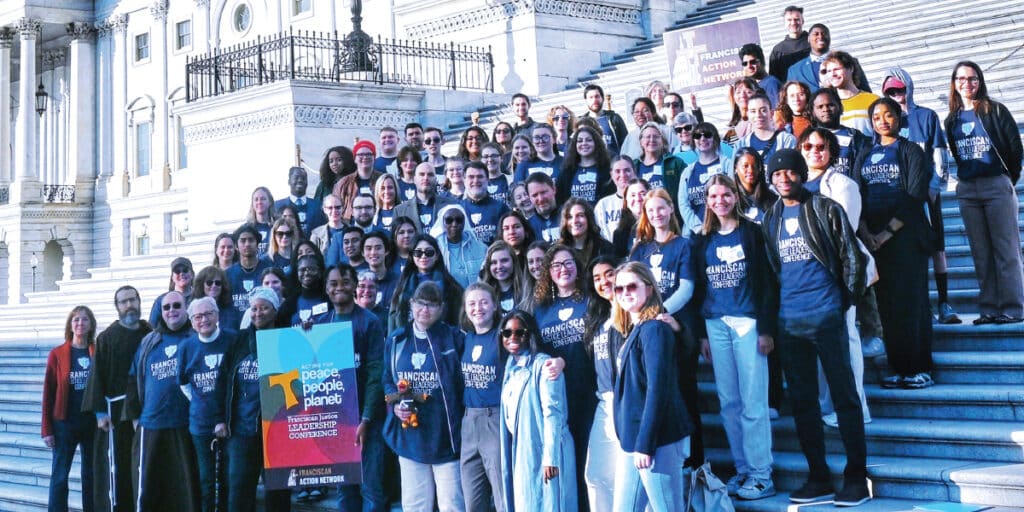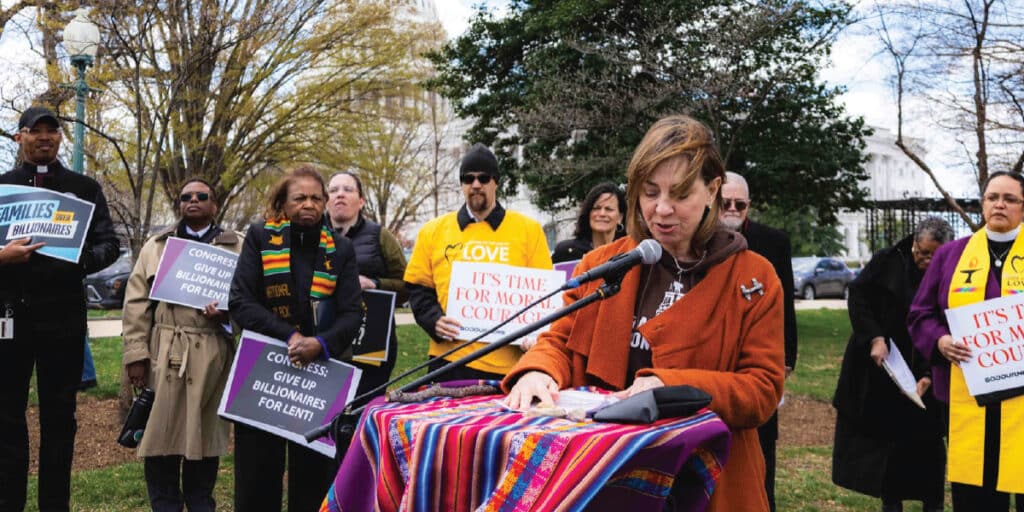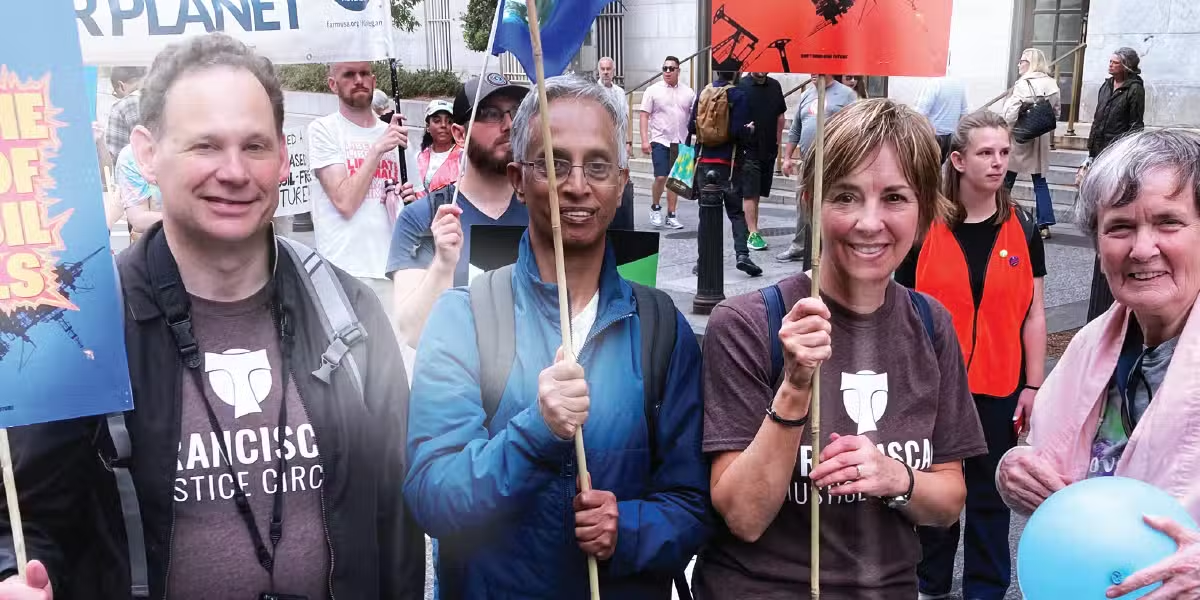In the cutthroat world of Washington, DC, Michele Dunne climbed to the top, only to discover that true fulfillment lay not in power or prestige, but in the Franciscan path of downward mobility.
Upward mobility is the name of the game in Washington, DC. Michele Dunne played the game, eventually reaching the peak of her career.
From the State Department to the US Embassy in Cairo, then to the National Security Council as director for Egypt and North Africa, Dunne had become a premier voice and diplomat for policymaking in the Middle East. She sought to stay true to herself and her values, even in the cutthroat, power-hungry milieu of Washington.
After the United States invaded Iraq in 2003, she left government and began teaching courses on the Middle East at Georgetown University. Her vast experience also landed her in other influential positions in Washington, such as think tanks like the Carnegie Endowment for International Peace and the Atlantic Council, where she continued to climb.
But then it all came crashing down.
‘I Can’t Do This’
In 2013, Dunne was vice president of the Atlantic Council and founding director of the Rafik Hariri Center for the Middle East when she faced an ethical dilemma that was impossible to ignore. As a series of pro-democracy protests known as the Arab Spring erupted across the Middle East, some special interests supported violent counterrevolutions to avert change. Even without working for the government, she saw how the tantalizing forces of power and money still called the shots.
Dunne had always seen her field as an opportunity for peacemaking in a part of the world ravaged by conflict. But as the pressure mounted to make decisions that benefited special interests, she knew she could no longer continue in her role. Dunne made a decision that aspiring movers and shakers in DC might find unthinkable. She willingly walked away from the highest position she had ever held.
“I thought, ‘I can’t do this,’” Dunne reflects, safeguarding the exact details of the situation. “I couldn’t stand against people [in the Arab Spring whom] I thought were fighting very bravely for their freedom and suffering massive human rights abuses as a result. In the world I was in, there was no way to avoid being deeply enmeshed in ‘empire.’ The United States and big business attempt to dominate that region, to the detriment of the people. It was a moment for me where I had reached the pinnacle of my professional achievement, and I was also more miserable than I had ever been.”
She took a step back in the world of foreign affairs. She returned to Carnegie, her former place of employment, but accepted a less prominent, behind-the-scenes role in research. On a deeper, personal level, Dunne’s disenchantment with government over the US invasion of Iraq, policy toward Israel/Palestine, and now think tanks (the opportunism of special interests during the Arab Spring), sent her on a spiritual search.
“When my own framework for success collapsed, I was desperate,” Dunne shares. “I thought to myself, ‘What do I use to make my decisions now?’ . . . But I learned something I never would have understood before, which was the beauty of downward mobility.”
New Perspective
Such is the nonlinear nature of the spiritual journey. Dunne had spent almost three decades climbing, just to seemingly fall.
But she could not go back. For the first time in her career, she was not trying to leverage her experience for a promotion or more prominent role. Her former colleagues thought she was crazy. Her husband, Dunne laughs, also thought she was crazy.
“I realized that I needed to return to being open to the movement of the Holy Spirit and God’s guidance in my life,” Dunne shares.
That movement of the spirit, Dunne says, came randomly in the middle of the night. Though a cradle Catholic, she knew little about St. Francis of Assisi. For some strange reason, she woke up one evening from a deep sleep and felt prompted to learn more about him.
“It really was as sudden as that,” she recalls. “And when I started looking into him, I quickly understood that Franciscanism—with its emphasis on poverty, humility, and simplicity—was the antidote to a lot of things that had gone wrong in my life—getting too involved with power and money, to put it simply.”
Dunne contacted a Secular Franciscan fraternity and began a three-year period of formation. Her career, the thing that she had always elevated, hung in the balance. But her soul was being fed in new ways as Franciscan values collided with the idols of “empire” and upward mobility.
“As soon as I picked up a biography on St. Francis and started reading it, I was like, ‘Oh, I think I see how I’ve been all wrong about this upward mobility thing,’” she says. “It’s really downward mobility that will lead to growth and happiness and peace and wholeness in life.”
Downward mobility—the notion that followers of Christ should go downward toward the impoverished and the margins in humble accompaniment rather than being consumed by the upward chasing of accolades or material possessions—was epitomized by St. Francis and his brothers in their dedicated service to those with leprosy and in poverty. It was also demonstrated by St. Clare in her midnight escape from nobility in the upper thresholds of Assisi when she ran downward toward the lower city levels where Francis had established his Gospel mission amid the poor and forgotten.
Dunne, still working in a research role at Carnegie, had no idea what awaited her professionally. But suddenly this notion of climbing mattered less. As long as she was orienting her life around the Franciscan values of spiritual poverty, humility, and simplicity, her heart was healthy, grounded, alive.
“I became a Secular Franciscan, and, honestly, once that happened, God just kept putting one door after another in front of me,” she says. “I made a pilgrimage to Assisi in 2019, which was life-changing. The way I think of it is that as I went through one door, more doors would appear. But God never compelled me to open a door. It was always by invitation, by choice.”
A Shift of Focus
One interesting focus began to shift within her. Though she had spent her career in international affairs, concerned about peace and human rights on the other side of the world, she began to ask herself the question, “What about here in my own country?”
Dunne began to enter the world of local activism. She volunteered with a number of secular organizations but was uncomfortable with some of the dualistic language they were using, seemingly getting energy from demonizing those with whom they disagreed. When she discovered the Franciscan Action Network (FAN)—a DC nonprofit that seeks to transform United States public policy related to peacemaking, care for creation, poverty, and human rights—Dunne was hooked.
She began showing up at protests, learning about issues, utilizing skills from her career and DC network to lobby for reform and policies that align with Franciscan peacemaking and its elevation of humanity.

“I was really looking for how I could be involved in activism, but in a way that fit fully with my spirituality and my values. FAN showed me that,” she says.
Whereas upward mobility is all about linear progression, always using experiences (and sometimes people) for one’s own personal gain, Dunne learned that volunteering can help cultivate the posture of downward mobility in one’s life as it orients oneself toward humble service and connection with the marginalized.
Dunne hadn’t been volunteering at FAN long before another unexpected door opened.
Entering Another Door
In 2021, Dunne felt called to apply for the position of FAN’s next executive director.
From her final ethical straw in a three-decade career in international affairs and the professional uncertainty that followed, to her sudden prompting to learn more about St. Francis of Assisi, to her formation as a Secular Franciscan, to her pilgrimage to Assisi, to now having a professional opportunity that actually aligned with her soul’s direction, Dunne was ready for a new challenge with a new perspective rooted in downward mobility. She accepted.
“I joked that I was FAN’s most active volunteer, and then, all of a sudden, one day, I showed up as the executive director,” she laughs. “The staff must have asked, ‘Wait a minute. What?’”
Even FAN’s leadership structure, Dunne quickly learned, was far different from the hierarchical ways of DC. At its core, the organization is a network, not a top-down institution. It was founded in 2007 after a retreat in Baltimore brought together 150 members of the Franciscan family—Catholics, Anglicans, Lutherans, and “Franciscan-hearted” individuals.
FAN emerged from a challenge posed by the global representatives of each of the six different branches of the Franciscan family and Franciscans International, an NGO with consultative status at the United Nations. The question was simple but profound: Where is the Franciscan voice in the policy decisions shaping the United States? From this, FAN was born, a 501(c)(3) organization dedicated to bringing Franciscan Gospel values—peacemaking, care for creation, addressing poverty, and human rights.
Mission in Action
The heartbeat of the mission, Dunne shares, is the “Franciscan Justice Circles” popping up all around the United States. These groups provide spaces for people—lay, religious, Franciscans, “Francis-curious,” or anyone drawn to the healing values of Franciscanism—to come together, build community, and discern how to respond to the needs around them, both in local and national policymaking.
Overseeing these Justice Circles is Nora Pfeiffer, who worked with Franciscans International and was shaped by time in South America and a deep love for Franciscan spirituality. Pfeiffer, who joined FAN in 2019, describes her role as a bridge builder, fostering mutual relationships between the organization’s DC advocacy office and grassroots communities nationwide.
Mutuality, Pfeiffer explains, moves FAN forward. The DC office helps to educate and mobilize Justice Circles, placing important justice initiatives on their radar and vice versa. Doors are opened, but there are no expectations to walk through. Though this kind of nonhierarchical leadership can be a challenge and feel foreign to some, it’s what FAN leaders strive for.
Says Pfeiffer: “Franciscan spirituality . . . is about ‘exchanging the good,’ seeing the good in the other and being open to receiving it and also offering your own. It’s all about that kind of mutuality.”
FAN’s work extends beyond local circles to national advocacy, culminating each year in the Franciscan Justice Leadership Conference in DC. Participants, donning Franciscan Action Network T-shirts, meet with congressional staff to advocate for policies like the Justice for Black Farmers Act, the Environmental Justice for All Act, and other legislation that Franciscan-hearted people have placed on FAN’s docket. “People are glowing after this experience at the Capitol,” Pfeiffer says. “They realize they can take part in democracy in meaningful and powerful ways, sharing their stories—like the students from Neumann University who spoke about a trash incinerator near their campus.”
Though FAN is sometimes critiqued for its seeming alignment with progressive politics, its focus on dialogue sets FAN apart from other modern-day activism that gains its energy by labeling politicians as good or evil, right or wrong. FAN, above everything, seeks mutual respect. It seeks to help people participate in the democratic process, not upend it. It seeks to transcend the left-right division that media and politicians exploit for financial gain and instead elevates the human person.

Pfeiffer says they seek to root their advocacy in “dignity and dialogue.” As goes its mission statement, “The Franciscan Action Network sees the interconnectedness of all creation and the common origin of humanity as rooted in God’s loving design for the earth and all people.” At the same time, while cultivating mutual respect and civility, FAN also has core principles that cannot result in silence. “Standing with the marginalized is not optional—it’s part of our DNA,” Pfeiffer says, drawing from a document by Father Tom Nairn, OFM, titled “Franciscan Values Guiding FAN.”
“Following the example of these saints, members of the Franciscan family today are called to be with and identify with the poor and vulnerable and with all who face discrimination of one form or another,” Father Tom writes. “We are called to be in solidarity with them in their struggle to have their God-given rights honored by others.”
Under Dunne’s leadership, FAN has grown into a vibrant network of 50 Franciscan religious communities, 17,000 individual members, and 30 Justice Circles across 23 states, including three on college campuses. “We’re building an intergenerational Franciscan movement,” Dunne says. “We speak out on issues but try to remain in relationship.”
Countering Upward Mobility
When Michele Dunne went on her life-changing trip to Assisi in 2019 amid her professional crisis, the theme of the pilgrimage was nonviolence. Most of us don’t think of ourselves as violent, yet the systems we inherit oftentimes have a violence to them. The idol of upward mobility, for example, while helping drive capitalism and innovation, expanding opportunity, and making something like the American Dream accessible, can also lead to the dehumanization of both oneself and others in the pursuit of money and power—a pursuit that can even unfold unconsciously.
As she spiraled into Franciscanism, culminating in her pilgrimage to Assisi, Dunne learned that Francis, too, was born into a world where upward mobility was idolized. The construction of Assisi, in fact, mirrored the class system of that day. Francis was born into the rising merchant class and thus grew up in the center of the hilltop town, beneath the nobles, but above the lepers and the poor. His desire to rise in society arguably fueled his ambition to become a knight, quite the violent life for a fun-loving and generous adolescent.
Already one can see how the enticing pull of upward mobility was stirring Francis to become someone he was not. And, like Dunne, the pursuit of upward mobility ultimately left Francis empty and broken, while also opening his heart to something else—the blessing of dead ends. Downward mobility, he discovered, was the antidote for some of his soul’s deepest desires.
“I learned that times of apparent failure in my life—when it feels like I’m lost, or have been on the wrong path, or like everything I’ve done has been a sham—that these are also moments of incredible opportunity,” Dunne shares. “Part of me felt like I had wasted my time in my career in international affairs, like I never should have taken this job or that job because of the difficulties and suffering that came with them, but without those jobs I wouldn’t be where I am today. I would never have made this radical shift and decided that I needed to get away from all this.”
As executive director of FAN, she hopes to invite others into this same transformative trajectory—one that is counterintuitive and uncomfortable but maybe can help heal ourselves and America. Shares Dunne: “Every door that is put in front of you involves stepping out of your comfort zone. . . . But then, of course, God catches you.”



1 thought on “A Diplomat’s Journey to Activism ”
Well said, beautiful, inspirational. Thank you for sharing.